The AMD Zen and Ryzen 7 Review: A Deep Dive on 1800X, 1700X and 1700
by Ian Cutress on March 2, 2017 9:00 AM ESTBenchmarking Performance: CPU Web Tests
One of the issues when running web-based tests is the nature of modern browsers to automatically install updates. This means any sustained period of benchmarking will invariably fall foul of the 'it's updated beyond the state of comparison' rule, especially when browsers will update if you give them half a second to think about it. Despite this, we were able to find a series of commands to create an un-updatable version of Chrome 56 for our 2017 test suite. While this means we might not be on the bleeding edge of the latest browser, it makes the scores between CPUs comparable.
SunSpider 1.0.2 [link]
The oldest web-based benchmark in this portion of our test is SunSpider. This is a very basic javascript algorithm tool, and ends up being more a measure of IPC and latency than anything else, with most high performance CPUs scoring around about the same. The basic test is looped 10 times and the average taken. We run the basic test 4 times.
Mozilla Kraken 1.1 [link]
Kraken is another Javascript based benchmark, using the same test harness as SunSpider, but focusing on more stringent real-world use cases and libraries, such as audio processing and image filters. Again, the basic test is looped ten times, and we run the basic test four times.
Google Octane 2.0 [link]
Along with Mozilla, as Google is a major browser developer, having peak JS performance is typically a critical asset when comparing against the other OS developers. In the same way that SunSpider is a very early JS benchmark, and Kraken is a bit newer, Octane aims to be more relevant to real workloads, especially in power constrained devices such as smartphones and tablets.
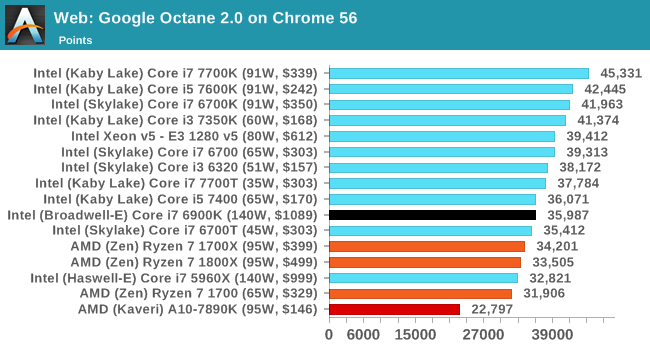
WebXPRT 2013 and 2015 [link]
While the previous three benchmarks do calculations in the background and represent a score, WebXPRT is designed to be a better interpretation of visual workloads that a professional user might have, such as browser based applications, graphing, image editing, sort/analysis, scientific analysis and financial tools. Web2013 is the older tool, superceded by Web2015, however both still are highly relevant for high-performance web applications today.
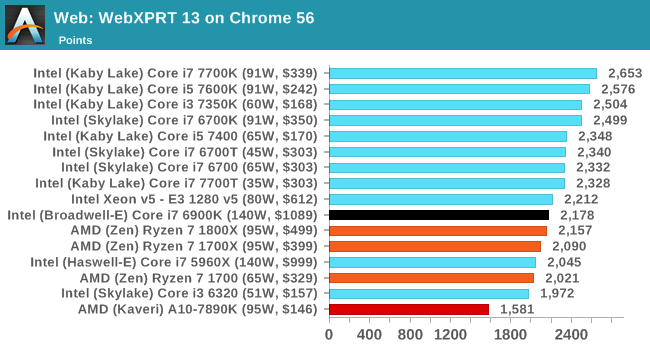
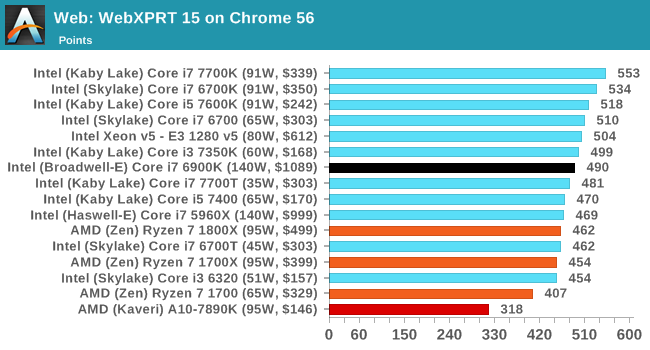


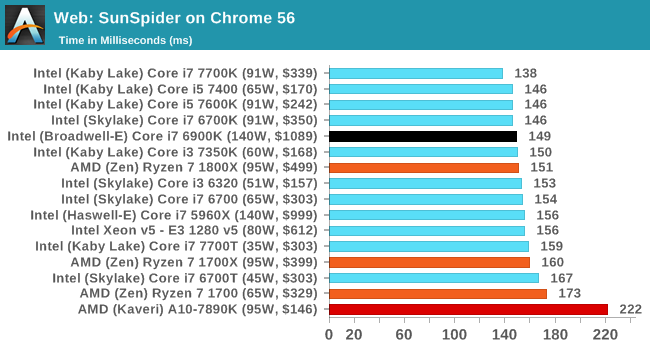
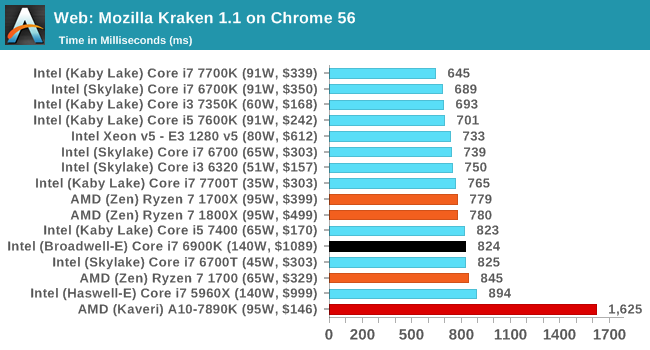








574 Comments
View All Comments
mikeZZZ - Friday, March 3, 2017 - link
Anadtech, can we please run closer to real life scenarios such as a gaming benchmark with a file compression benchmark running at the same time. Even gaming enthusiasts run more than one program at a time. For example, file decompression in the background while playing a game, or baseball game streaming in a small window while playing a game. You already have many individual benchmarks, so why not go the extra but significant benchmark of running two? We know this favors the higher core CPUs (maybe even Ryzen 7 1700 over all other lower core ones CPUs) but that is closer to real life and should be very meaningful to someone wanting to make an informed purchase.ValiumMm - Saturday, March 4, 2017 - link
Would also like to see thisUrQuan3 - Friday, March 3, 2017 - link
Just want to put out a quick comment about benchmarking with Handbrake. In dealing with Broadwell-E, and especially ThunderX, I've found that Handbrake often doesn't scale well past about 10 cores, and really doesn't scale well past 16 or so. What seems to happen is that the single-threaded parts of Handbrake tend to dominate the encode time. In extreme cases, ultra-fast and placebo will take almost the same amount of time as x264 is consuming input faster than the rest of Handbrake can generate it. On ThunderX, I've found I can complete four 1080p placebo encodes in the same amount of time that I can complete one. I would expect a similar result on a 48 core Intel, though I do not have access to one beyond 24 cores. Turbo boost would hide this effect a bit.I am not knocking using Handbrake for benchmarking. The Handbrake and ray-trace results are the two that I care about most. I just thought I'd give a heads up about this limitation. You can check CPU usage statistics to get an indication of when you are running up against this limit.
Oh, and I am very excited to see multiple ray-tracers in your runs. Please continue.
Meteor2 - Saturday, March 4, 2017 - link
Presumably though you can have several x264 jobs running simultaneously on that hardware? So while your time to encode a certain piece doesn't decrease, you have more total-throughput (e.g. encoding several different bitrates for adaptive streaming). Should give good efficiency too on a larger Broadwell-E or a ThunderX.UrQuan3 - Tuesday, March 7, 2017 - link
Exactly. It's the first time I've thought about installing a queue manager for a single computer.jade5419 - Saturday, March 4, 2017 - link
I agree with this. In my experience Handbrake has a core / thread limit.I have a Z600 system with dual Xeon 5570 @ 2.93GHz, 6 core / 12 threads (total 24 threads), 48GB of RAM and a Z620 system with dual Xeon E5-2690 @ 2.9GHz 8 core / 16 threads (total 32 threads), 64GB RAM.
The two systems transcode video at the same speed using Handbrake 1.0.3. Monitoring CPU usage shows all threads of the Z600 at 100% utilization whereas the CPU utilization on the Z620 is approximately 80%.
Notmyusualid - Sunday, March 5, 2017 - link
Ever tried running GTA5 on 28 cores?It doesn't work. You have to adjust the game 'launchers' core affinity to < 26 cores or it won't even load.
Given this discovery, I expect there are many more applications out there, that may crap-out as we see more and more cores come into the mainstream.
Just a thought.
mapesdhs - Sunday, March 5, 2017 - link
I'd love to know why this happens. I'm guessing something dumb within Windows.Outlander_04 - Friday, March 3, 2017 - link
There is more than enough good news to make me want to buy a 6 core Ryzen when they become available .Likely that will be the sweet spot for gamers
0ldman79 - Saturday, March 4, 2017 - link
I'm looking forward to seeing Ryzen updated in the bench.There aren't any apps or benchmarks that cross over between the FX series and the Ryzen series, so we can't do any side by side comparison.
Great review guys. Looking forward to the six core Ryzen. I think just like the FX series the six core will be the sweet spot.